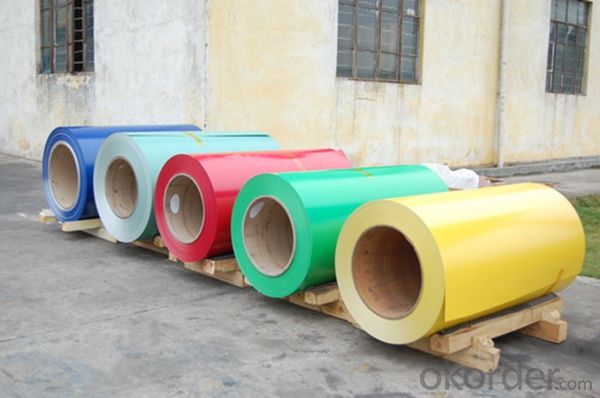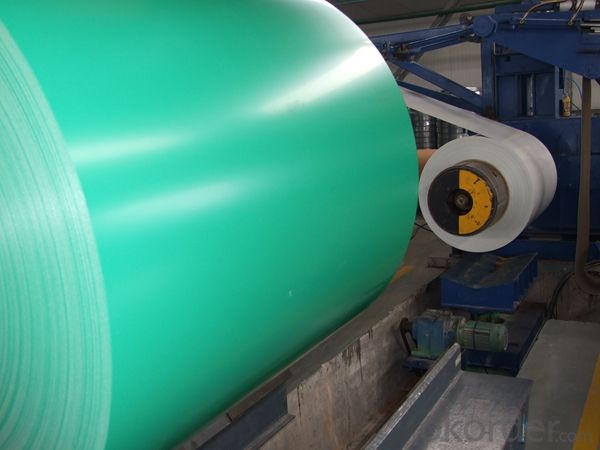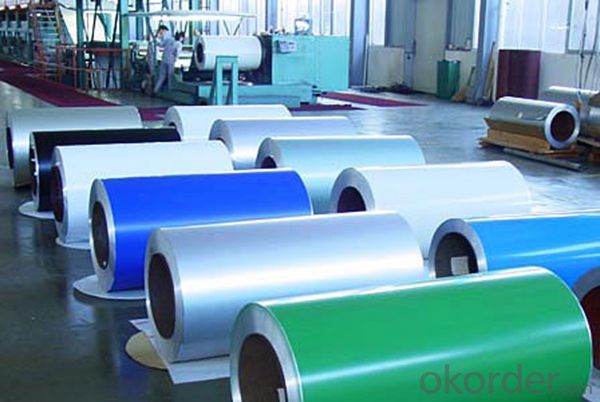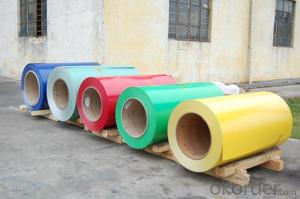Color Coating Aluminum Coil for Building
- Loading Port:
- Shanghai
- Payment Terms:
- TT OR LC
- Min Order Qty:
- 5 m.t.
- Supply Capability:
- 10000 m.t./month
OKorder Service Pledge
OKorder Financial Service
You Might Also Like
Item specifice
1. Specification of Color Coating Aluminum Coil for Building
Name | 3003 Aluminum Coil |
Brand | PinRui |
Alloy | 1100H-18, 3003-H24,3003-H26,3005-H26,8011,3004,3105,5005,etc. |
Thickness | 0.1~1.5mm |
Width | <2000mm< span=""> |
MOQ | 1 MT |
Coating finish | Brushed, drawing, embossed, printing |
Color | As to code RAL |
Surface | Embossed,Mill Finish,Coated,Brushed |
Gloss | 10-90%(EN ISO-2813:1994) |
Total coating thick | PVDF27 ~35micron |
Polyester18~27micron(EN ISO-2360:1995) | |
Coating hardness | 2H |
Adhesion | 5B (EN ISO-2409:1994) |
Impact resistance | No cracking and peeling (A.S.T.M D2794-1993) |
Flexibility (T-bend) | 0T- 2T |
MEK resistance | 100 |
Certification | ISO9001:2000, CE, SGS |
Coil's standard diameter | 1100mm |
Inner Diameter | 405mm/505mm |
Coil's standard weight | 1MT - 2MT |
2. Application of Color Coating Aluminum Coil for Building
(1).Interior: wall cladding, ceilings, bathrooms, kitchens and balconies, shutters, doors...
(2).Exterior: wall cladding, facades, roofing, canopies, tunnels,column covers , renovations...
(3).Advertisement: display platforms, signboards, fascia, shop fronts...
3. Feature of Color Coating Aluminum Coil for Building
*Such coil is specially designed to replace aluminum ingot, due to the high export tax of aluminum ingot, the coil has better price than ingot.
*This type of coil can fit customer's remelting furnace just like ingot, no need to make any change to the production line that was previously used for ingot. The standard coil size and weight is very suitable for the feed gate of furnace.
*This type of coil causes less material wastage than ingot when remelted.
*Our coil is made directly from ore, no need to go though the ingot making process, quality is much better than other suppliers who use ingot scrap to make coil.
Be free from Oil Stain, Dent, Inclusion, Scratches, Stain, Oxide Dicoloration, Breaks, Corrosion, Roll Marks, Dirt Streaks and other defect which will interfere with use
4. Certificate:
SGS and ROHS(if client request, paid by client), MTC(plant provided), Certificate of Origin(FORM A, FORM E, CO), Bureau Veritas and SGS (if client request, paid by client), CIQS certificate
5. Image of Color Coating Aluminum Coil for Building



6. Package and shipping of Color Coating Aluminum Coil for Building
eye to wall
eye to the wall
with wood pallet (wooded case also available)
7. FAQ
1) What is the delivery time?
Dpends on actual order, around 20 to 35 days
2)What is the QC system:
We have QC staff of 20 persons and advanced equipment, each production is with MTC traced from Aluminum ingot lot.
3) What market do you mainly sell to?
Australia, America, Asia, Middle East, Western Europe, Africa etc
- Q:Can aluminum coils be used in the production of aluminum ceilings?
- Yes, aluminum coils can be used in the production of aluminum ceilings. The coils are typically processed and shaped into sheets, which are then used to create the ceiling panels.
- Q:Are aluminum coils suitable for air conditioning systems?
- Air conditioning systems can utilize aluminum coils, which are commonly employed due to their numerous advantages. Firstly, aluminum, being a lightweight material, facilitates ease of handling and transportation during installation. Additionally, this lightweight characteristic reduces the unit's overall weight, rendering it more energy-efficient. Moreover, aluminum coils possess exceptional heat transfer properties, thereby enabling efficient air cooling. They exhibit enhanced thermal conductivity, facilitating rapid and effective heat transfer. Consequently, this leads to improved cooling performance and enhanced energy efficiency, resulting in reduced electricity consumption and long-term cost savings. Furthermore, aluminum coils surpass other materials, such as copper, in terms of superior corrosion resistance. Given the exposure of air conditioning systems to moisture and humidity, this resistance is crucial. Aluminum coils can withstand these conditions without corroding or deteriorating, ensuring a longer lifespan and reliable performance. Another advantage of aluminum coils lies in their affordability. Aluminum is a cost-effective material, making it a favored choice among air conditioning manufacturers. This affordability subsequently translates into lower costs for consumers, making air conditioning systems more accessible and economically viable. In conclusion, the suitability of aluminum coils for air conditioning systems is evident due to their lightweight nature, impressive heat transfer properties, corrosion resistance, and affordability. They offer efficient cooling capabilities, durability, and cost-effectiveness, establishing themselves as the preferred choice for air conditioning units.
- Q:I am confused by that. One guy told me that he puts aluminium foil on his modem to receive the Internet better. Another guy told me that aluminium stops all kind of rays. What is correct?
- to improve WiFi signals. But it just acts like a reflector. In other words it increases the signal in one direction and reduces it in another. Another guy told me that aluminium stops all kind of rays. It reflects some kinds of waves. It does not reflect or stop high energy stuff like X-rays and gamma rays.
- Q:How are aluminum coils used in solar panels?
- Aluminum coils are used in solar panels as part of the construction and structure of the panel. They are used to hold the solar cells in place and provide a sturdy framework for the overall structure. Additionally, aluminum coils help with heat dissipation and ensure efficient functioning of the solar panel by preventing warping or damage caused by temperature fluctuations.
- Q:What are the common testing methods for aluminum coils?
- There are several common testing methods for aluminum coils that are used to ensure their quality and performance. These methods include: 1. Visual inspection: This involves a thorough examination of the coils for any visible defects such as dents, scratches, or surface irregularities. Visual inspection is a basic and initial step in the testing process. 2. Dimensional measurement: This method involves measuring the dimensions of the aluminum coils to ensure they meet the specified requirements. This includes measuring the length, width, and thickness of the coils. 3. Tensile testing: Tensile testing is performed to assess the mechanical properties of the aluminum coils, such as their strength and elasticity. This test involves applying a tensile force to a sample of the coil until it breaks or deforms, allowing for the determination of its tensile strength. 4. Hardness testing: The hardness of aluminum coils is an important factor in determining their suitability for specific applications. Various hardness testing methods, such as Rockwell or Brinell hardness tests, can be used to measure the resistance of the coil's surface to indentation or scratching. 5. Chemical composition analysis: This method involves analyzing the chemical composition of the aluminum coil to ensure it meets the required specifications. Common techniques used for this analysis include spectroscopy or X-ray fluorescence (XRF) analysis. 6. Corrosion resistance testing: Aluminum coils are often exposed to harsh environmental conditions, so assessing their resistance to corrosion is crucial. This can be done through various tests like salt spray testing or electrochemical impedance spectroscopy (EIS) to determine the coil's ability to withstand corrosion. 7. Coating quality assessment: If the aluminum coil is coated with a protective layer, testing methods such as adhesion testing, coating thickness measurement, or impact resistance testing can be used to ensure the quality and durability of the coating. These are some of the most common testing methods employed for aluminum coils. By conducting these tests, manufacturers can ensure that the coils meet the required standards and perform optimally in their intended applications.
- Q:What are the potential applications of coil-embossed aluminum coils?
- Coil-embossed aluminum coils have a wide range of potential applications due to their unique features and properties. Here are some of the potential applications: 1. Building and construction: Coil-embossed aluminum coils can be used in the construction industry for various purposes. They can be used as roofing materials, wall cladding, and exterior decorative panels. The embossed pattern provides aesthetic appeal and enhances the overall appearance of the building. Additionally, the corrosion-resistant properties of aluminum make it a durable choice for outdoor applications. 2. Automotive industry: Coil-embossed aluminum coils find applications in the automotive industry. They can be used for manufacturing body panels, trims, and decorative elements for vehicles. The embossed surface adds texture and style to the automotive components while providing durability and resistance to wear and tear. 3. Appliances and electronics: The embossed patterns on aluminum coils make them suitable for use in appliances and electronics. They can be used for manufacturing refrigerator panels, microwave casings, and other household appliances. The textured surface can also enhance the grip on handheld electronic devices. 4. Packaging industry: Coil-embossed aluminum coils have potential applications in the packaging industry. They can be used for manufacturing packaging materials such as cans, containers, and lids. The embossed surface can provide a unique branding opportunity, allowing companies to create visually appealing packaging designs. 5. Signage and advertising: The embossed patterns on aluminum coils can be utilized in the signage and advertising industry. They can be used for manufacturing outdoor signs, billboards, and display panels. The embossed surface adds depth and dimension to the signage, making it more eye-catching and attractive. 6. Furniture and interior design: Coil-embossed aluminum coils can be used in the furniture and interior design industry. They can be used for manufacturing decorative panels, furniture trims, and accents. The embossed patterns can add a touch of elegance and uniqueness to furniture and interior spaces. 7. Renewable energy: Aluminum is a lightweight and corrosion-resistant material, making it suitable for renewable energy applications. Coil-embossed aluminum coils can be used for manufacturing solar panels and wind turbine components. The embossed surface can enhance the efficiency of solar panels by increasing light absorption and reducing reflection. Overall, coil-embossed aluminum coils have a wide range of potential applications across various industries. The embossed patterns, along with the inherent properties of aluminum, make them a versatile material choice for both functional and aesthetic purposes.
- Q:What are the different types of alloys used for aluminum coils?
- There are several different types of alloys that are commonly used for aluminum coils. The most commonly used alloy for aluminum coils is 3003. This alloy is known for its excellent corrosion resistance and moderate strength. It is often used in applications where high strength is not required, such as in roofing and siding. Another commonly used alloy for aluminum coils is 5052. This alloy has good weldability and formability, making it suitable for a wide range of applications. It is often used in the automotive industry for body panels and fuel tanks. 6061 is another popular alloy for aluminum coils. This alloy has excellent strength and is often used in structural applications. It is commonly used in the aerospace industry for aircraft parts and in the construction industry for structural components. Other alloys that are used for aluminum coils include 1100, 5005, and 8011. Each of these alloys has its own unique properties and characteristics, making them suitable for different applications. For example, 1100 is known for its high electrical conductivity and is often used in electrical applications, while 8011 is commonly used for packaging and food containers due to its excellent corrosion resistance. In summary, the different types of alloys used for aluminum coils include 3003, 5052, 6061, 1100, 5005, and 8011. These alloys offer a range of properties and characteristics that make them suitable for various applications across industries such as automotive, aerospace, construction, and packaging.
- Q:What are the different coil edge profiles available for aluminum coils?
- Aluminum coils come with a variety of coil edge profiles. Some commonly used profiles are: 1. Slit edge: This is the most basic type, where the coil is simply slit to the desired width. The edges of the coil are usually sharp and may have burrs or roughness. 2. Deburred edge: In this profile, the sharp or rough edges of the coil are removed through deburring. Deburring enhances safety and prevents damage to downstream equipment during processing. 3. Rounded edge: This profile involves rounding the edges of the coil through rolling or machining. Rounded edges are often preferred in applications that prioritize safety or involve frequent handling of the coil. 4. Beveled edge: Beveled edge profiles are created by cutting or grinding the edges of the coil at an angle. This profile is commonly used when two coils need to be joined together, as the beveled edges enable a smoother and more secure connection. 5. Custom edge profiles: Depending on the specific requirements of the application, custom edge profiles can be developed. These profiles are tailored to meet the unique needs of the customer and may involve a combination of different edge treatments. It's important to consider the intended application, processing requirements, and desired aesthetic appearance when choosing a coil edge profile. Manufacturers and suppliers of aluminum coils typically offer a range of edge profiles to accommodate different customer needs.
- Q:What is the shelf life of aluminum coils?
- The shelf life of aluminum coils can vary depending on various factors such as storage conditions, handling, and the specific alloy used. Generally, aluminum coils can have a shelf life of several years if stored properly. It is recommended to store them in a dry and clean environment, away from moisture, extreme temperatures, and corrosive substances. Additionally, handling should be done with care to prevent any damage or contamination that may reduce the shelf life. Regular inspection and maintenance are also important to ensure the integrity and longevity of aluminum coils. Ultimately, consulting the manufacturer's guidelines or contacting a professional in the industry can provide more accurate information on the specific shelf life of aluminum coils.
- Q:Are there any specific guidelines for the storage of aluminum coils?
- Yes, there are specific guidelines for the storage of aluminum coils. Aluminum coils should be stored in a dry, well-ventilated area to prevent moisture buildup and corrosion. They should be stacked horizontally on a level surface, with proper support to avoid deformation. Additionally, it is recommended to cover the coils with a protective material, such as plastic or cloth, to prevent dust, dirt, or other contaminants from accumulating on the surface.
1. Manufacturer Overview |
|
|---|---|
| Location | |
| Year Established | |
| Annual Output Value | |
| Main Markets | |
| Company Certifications | |
2. Manufacturer Certificates |
|
|---|---|
| a) Certification Name | |
| Range | |
| Reference | |
| Validity Period | |
3. Manufacturer Capability |
|
|---|---|
| a)Trade Capacity | |
| Nearest Port | |
| Export Percentage | |
| No.of Employees in Trade Department | |
| Language Spoken: | |
| b)Factory Information | |
| Factory Size: | |
| No. of Production Lines | |
| Contract Manufacturing | |
| Product Price Range | |
Send your message to us
Color Coating Aluminum Coil for Building
- Loading Port:
- Shanghai
- Payment Terms:
- TT OR LC
- Min Order Qty:
- 5 m.t.
- Supply Capability:
- 10000 m.t./month
OKorder Service Pledge
OKorder Financial Service
Similar products
New products
Hot products
Related keywords





























